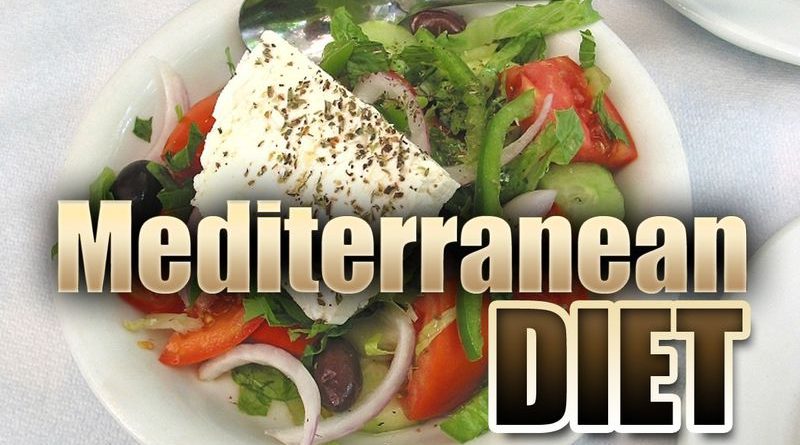What is the Mediterranean Diet? How to do it?
The Mediterranean diet was examined by Harvard’s Health Organization in 1993 and recommended as a type of nutrition in the treatment of many diseases. Moreover, the “Mediterranean Diet Pyramid” was also created. The Mediterranean diet is a diet plan based on eating healthy food instead of a regular diet plan. At the bottom of this pyramid, there are vegetables and fruits, olive oil and grains, fish and seafood on it, dairy products, then chicken and red meat in the last row.
As you can see from the Pyramid, the most popular ingredients of the Mediterranean cuisine are at the basis of this diet. Olive oil, aromatic herbs, fish and seafood, pulses, bread and olives are among the things you will consume the most in this diet. Unlike other diets, it emphasizes the consumption of fish, not red or white meat.
What to Eat in the Mediterranean Diet?
- Fresh vegetables and fruits should be included in the diet plan every day.
- Grain products such as oats, brown rice, soybeans, flax seeds, pasta, couscous, brown bread varieties should be included in the diet plan.
- Vegetable and legume meals should be prepared with seed oils such as olive oil and hazelnut oil.
- Foods such as olive oil, hazelnut oil, walnut, almond, hazelnut and avocado should be preferred instead of butter and coconut oil as oil sources.
- Chicken and fish meat should be consumed 2 days a week, and eggs should be eaten every other day.
- Red meat and sweet foods should be consumed once a month.
- Milk and milk products such as milk, yoghurt, buttermilk, cheese should be preferred.
Good quality olive oil, olives, sourdough bread, olives, cheese, especially green leafy vegetables, low sugar fruit, nuts, legumes and most importantly fish in the Mediterranean diet. Fish is a must in this diet. It differs from other diet and nutritional varieties in that it is a type of nutrition based on the consumption of healthy oils. The fact that poultry and red meat are consumed in small amounts and that products such as eggs, yoghurt and cheese are consumed less than other diets are also factors that differentiate the Mediterranean diet. Not to mention that there are not many snacks and it is mostly dried fruits and nuts for snacks.
While on the Mediterranean diet, you can choose an omelette, olives and bread for breakfast in the mornings, or a breakfast consisting of a trio of yoghurt, oats and fruit. For lunch, you can consume a sandwich or a fish salad made of whole wheat flour, rye or grain bread, such as cheese. Apart from these, you can choose legumes, fish and salad trio for your dinner. In cases where you want to make a snack, you can get support from fruits and nuts. Do not neglect to drink lots of water.
Should Not Be Eaten İn The Mediterranean Diet
Processed meats (salami, sausage, etc.), high sugar fruits and desserts, salty nuts, carbonated and sugary drinks (especially fruit juices), sugary and fatty pastries are not eaten in the Mediterranean diet. Apart from these, it is recommended to consume small amounts of foods such as red meat, eggs and chicken. In addition, foods with low grain value such as white bread are not recommended in the Mediterranean diet.
Mediterranean Diet Guide
- Increase your vegetable consumption. Food samples such as salads with lots of greens, baked vegetables, vegetable soups and vegetable pizza can be added to the meals.
- Change your eating habits with meat. Red meat consumption should be limited. When meat dishes are preferred, the portion of the meat can be reduced and pasta, rice, boiled vegetables can be prepared.
- Consume dairy products. Milk and dairy products should be preferred with semi-fatty ones. Especially yoghurt and cheese can be included in the diet plan.
- Eat seafood twice a week. Fish varieties such as herring, salmon, sardines and tuna are rich in Omega3 fatty acids. Seafood such as oysters and mussels are also beneficial for human health. Consumption of these foods can be increased.
- Have a vegetarian meal in the evening once a week. In order to get used to olive oil dishes and vegetable consumption during the start of Mediterranean nutrition, a vegetarian diet can be applied in 1 meal. Legumes and vegetable dishes can be flavored with spices. Salads prepared with foods such as beans, chickpeas and lentils can be consumed.
- Use good oils. Oil types such as olive oil, hazelnut oil and peanut oil can be added to daily meals. The need for fat in the diet can be met from healthy oils, foods such as walnuts, almonds, hazelnuts and avocados.
- Choose whole grain products. Whole grain products contain many nutrients and also affect the prolongation of satiety thanks to their rich fiber content. Mediterranean seeds such as bulgur, barley, black and red rice can be consumed in meals.
- Eat fresh fruit for dessert. Fresh fruits can be preferred to meet the dessert needs during the day. Desserts and ice cream can be consumed in celebratory meals.
What Are the Benefits of the Mediterranean Diet?
After it was seen that the quality of life of people living in Mediterranean coastal countries was higher, this diet was started to be examined. Studies have also concluded that this type of diet has many benefits for human health. The fact that this diet is rich in unsaturated fatty acids, consumption of antioxidant sources and high fiber content affect health in many ways, from brain health to digestive system health.
- It protects against Alzheimer’s disease, reduces the risk of depression and Parkinson’s disease.
- It has a protective effect against cancer and strengthens the immune system.
- It is good for cardiovascular health.
- It helps to reduce high blood pressure and bad cholesterol.
- It reduces the risk of developing Type-2 diabetes.
- It reduces the risk of heart attack.
What are the Harms of the Mediterranean Diet?
In the Mediterranean diet, 35-40% of the daily energy intake is fat-based foods. Therefore, this value is high compared to a normal healthy eating plan. Experts say that less than 35% of the daily energy intake in a healthy diet should be from fat sources. Although oil varieties such as walnut, hazelnut, and olive oil have an effect on protecting heart health, it is thought that excessive amounts of fat taken with diet may cause health problems such as high cholesterol in the future.
How Many Weight Loss in the Mediterranean Diet?
When compared to other specific diet types, the Mediterranean style diet seems to be a diet that does not have strict rules like them. Therefore, it is a form of nutrition that is easy to apply and maintain. The Mediterranean diet is not much different from other healthy olives diets. Therefore, a weight loss of 0.5 – 1 kg per week can be seen. This means that there may be an average weight loss of 3 or 6 kg per month.
Mediterranean Diet List
Get a 5-day sample diet list about what and when you will consume this diet. For the diet list suitable for you, we recommend that you consult a nutritionist.
1 day
- Breakfast: 2 slices of wholemeal bread (rye, you can also consume sourdough bread), 1 slice of unsalted feta cheese, 5-6 unsalted olives, 1 tablespoon of olive oil, lots of cucumbers, tomatoes and greens.
- Lunch: Green salad with tuna and olive oil + 1 slice of wholemeal bread
- Dinner: Vegetable meal with olive oil + low-fat yogurt + salad
- Snacks: Fruit + semi-skimmed milk + raw almonds (raw hazelnuts, walnuts, cashews, etc.)
2 days:
- Breakfast: 2 slices of feta cheese + 1 slice of whole wheat bread + 5-6 olives, lots of cucumbers and tomatoes.
- Lunch: Grilled vegetables in the oven + 3-4 tablespoons of pasta with a sauce prepared with whole wheat flour or wholemeal, olive oil + Ayran
- Dinner: Legumes with olive oil + half-fat yogurt + a little olive oil salad
- Snacks: Fruit + semi-skimmed milk + raw almonds (raw hazelnuts, walnuts, cashews, etc.)
3 days:
- Breakfast: Half-fat yogurt + 3 spoons of oatmeal + a serving of fresh fruit
- Lunch: Cheese and avocado salad + whole wheat bread + buttermilk
- Dinner: Grilled fish + green salad
- Snacks: Fruit + semi-skimmed milk + raw almonds (raw hazelnuts, walnuts, cashews, etc.)
4 days
- Breakfast: Omelet with unsalted feta cheese, cooked in olive oil + 5-6 olives + 1 slice of wholemeal bread + Greens
- Lunch: Legumes with olive oil + Half-fat yogurt + Salad
- Dinner: Vegetable meal with olive oil + Buckwheat pilaf + Ayran or semi-fat yogurt
- Snacks: Fruit + semi-skimmed milk + raw almonds (raw hazelnuts, walnuts, cashews, etc.)
5 days:
- Breakfast: 2 tablespoons of curd cheese + 3 walnuts + 1 slice of wholemeal bread + lots of cucumbers, tomatoes and greens
- Lunch: Boiled lentil salad + buttermilk
- Dinner: Vegetable meal with olive oil + salad + bran bread
- Snacks: Fruit + semi-skimmed milk + raw almonds (raw hazelnuts, walnuts, cashews, etc.)
Example of a 1-Week Mediterranean Diet List
Monday
- Breakfast: 1 egg + 1 slice of low-fat feta cheese + whole wheat bread + tomato, cucumber
- Lunch: Tuna fish salad with lots of greens + 1 slice of whole wheat bread
- Search: Semi-skimmed milk + Almond
- Dinner: Vegetable meal with olive oil + low-fat yogurt + salad
- Snack: Fruit
Tuesday
- Breakfast: 2 slices of feta cheese + Olives + Wholemeal bread + Tomato, cucumber, greens
- Lunch: Grilled Vegetables + Pasta + Ayran
- Search: Fruit + nuts
- Dinner: Legumes with olive oil + half-fat yogurt + salad
- Search: Semi-skimmed milk + fruit
Wednesday
- Breakfast: Half-fat yogurt + 3 spoons of oatmeal + fruit
- Lunch: Cheese and avocado salad + whole wheat bread + buttermilk
- Search: Semi-skimmed milk + walnuts
- Dinner: Grilled fish + green salad
- Search for: Fruit
Thursday
- Breakfast: Cheese omelette + olives + wholemeal bread + Greens
- Lunch: Legumes with olive oil + Half-fat yogurt + Salad
- Search: Fruit + almond
- Dinner: Vegetable meal with olive oil + Bulgur pilaf + Ayran
- Search: Half-fat yogurt + walnuts
Friday
- Breakfast: Curd cheese + Walnut + Wholemeal bread + Tomato, cucumber
- Lunch: Boiled lentil salad + ayran
- Search: 1 bowl of yoghurt + fruit
- Dinner: Vegetable meal with olive oil + salad + bran bread
- Search for: Fruit
Saturday
- Breakfast: Semi-skimmed milk + Hazelnut + 2 tablespoons of oatmeal + fruit
- Lunch: Vegetable pasta + buttermilk + salad
- Search: Fruit + walnut
- Dinner: Grilled Chicken + Half Fat Yogurt + Boiled Vegetables
- Search: Semi-skimmed milk + fruit
Sunday
- Breakfast: Menemen + Semi-fat feta cheese + Wholemeal bread + greens
- Lunch: Sandwich made of whole grain bread + buttermilk
- Search: Fruit + almond
- Dinner: Soup + Legumes with Olive Oil + Salad
- Search: Semi-skimmed milk
Frequently Asked Questions About the Mediterranean Diet
Can I follow the Mediterranean diet to lose weight?
Of course! But more importantly, this diet is a one-to-one diet for a healthy diet. This diet, which mostly encourages plant nutrition and is high in healthy fat, is a diet with high fiber content that will both reduce calorie intake and keep cholesterol under control. For this reason, it is also perfect for losing weight.
Is it sweet to eat in the Mediterranean diet?
There are many delicious, healthy desserts in the Mediterranean diet. Most of the Mediterranean diet desserts are predominantly fruit, honey, yogurt and olive oil. As long as you stay away from flour desserts, of course you can consume it!
Can Tea and Coffee be Drunk on a Mediterranean Diet?
Caffeine-source beverages such as tea and coffee can be drunk. However, care should be taken to ensure that these drinks are sugar-free.
Can Eggs be Eaten on a Mediterranean Diet?
In this diet, eggs are not among the prohibited foods and can be consumed. However, the recommended amount is to be consumed every 2 days.
How Many Meals are Fed in the Mediterranean Diet?
As with a healthy diet, a diet plan prepared as 3 main meals and 2-3 snacks can be applied.
8 Thinsg That Slow Your Metabolism



